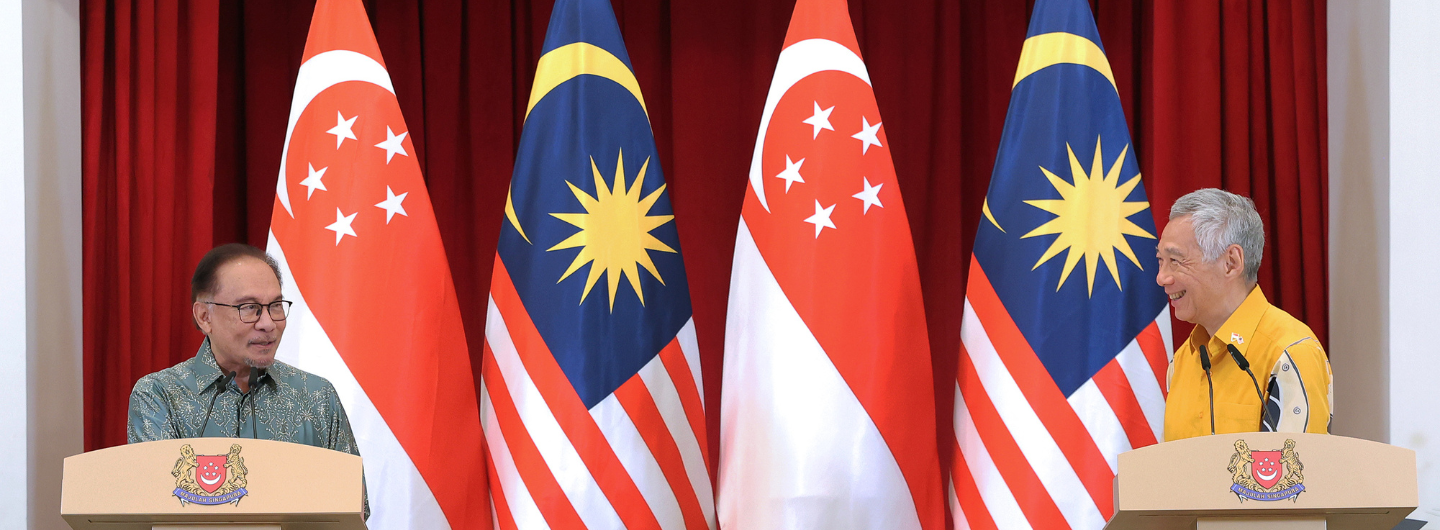
|
Getting your Trinity Audio player ready...
|
Longtime neighbours and trading partners, Singapore and Malaysia are reaffirming their commitment to bolstering economic cooperation and people-to-people ties, particularly in the areas of the digital and green economy. At the 10th Singapore-Malaysia Leaders’ Retreat, Prime Minister Lee Hsien Loong of Singapore and Prime Minister Dato’ Seri Anwar Ibrahim of Malaysia emphasised the importance of their joint efforts.

The leaders emphasised the robust nature of Singapore and Malaysia’s bilateral relationship. Both countries are each other’s second-largest trading partners, underscoring the vital role they play in each other’s economies. Investments from Singapore to Malaysia have seen substantial growth, and Singapore has emerged as the top foreign investor in Malaysia in the first half of 2023.
The leaders acknowledged the need for enhanced cooperation in a post-pandemic world filled with uncertainties, particularly in the domains of digital and green economies. During Prime Minister Anwar’s introductory visit in January, two Framework Agreements were signed, one on the Digital Economy and another on the Green Economy. These agreements lay the foundation for comprehensive collaboration, fostering a win-win partnership that benefits both nations.
Within the ASEAN context, Singapore and Malaysia are working closely to bolster regional collaboration, emphasising ASEAN’s centrality, especially in the emerging fields of digital and green economies. The two countries are committed to advancing the shared interests and aspirations of the ASEAN community.
Among the significant collaborative initiatives discussed, the creation of a Johor-Singapore Special Economic Zone (JS-SEZ) took the spotlight. This substantial project aims to enhance cross-border trade, facilitate the flow of goods and people, and strengthen the overall business ecosystem. The JS-SEZ is poised to boost economic attractiveness for both Singapore and Johor, ushering in new opportunities for economic growth and development on both sides.
Both Singapore and Malaysia are steadfast in their commitment to transitioning towards a low-carbon and sustainable future. To this end, the leaders have agreed to reinforce cooperation on renewable energy.
A notable aspect of this collaboration is the pursuit of cross-border electricity trading, which promises mutual benefits for both nations. Renewable energy sources are anticipated to be harnessed from both Peninsula Malaysia and East Malaysia, facilitating a shift towards cleaner and more sustainable energy practices.
Enhancing connectivity between Singapore and Malaysia is a priority. The Rapid Transit System (RTS) Link between Johor Bahru (JB) and Singapore is a key project aimed at providing a more convenient travel option for citizens of both countries. The anticipated completion of this project by the end of 2026 is eagerly awaited, as it represents the third land link between Singapore and Malaysia, enhancing mobility and economic integration.
Efforts to alleviate congestion at land checkpoints have also been discussed. Initiatives have been introduced to streamline cross-border travel while maintaining border security. These steps, along with the redevelopment of the Woodlands Checkpoint, signify Singapore’s commitment to improving border infrastructure.
The leaders highlighted various areas of bilateral cooperation, reflecting the depth and breadth of the relationship between the two nations. The Triennial Malaysia-Singapore Cultural Showcase (TCS) held in Singapore was commended for its role in deepening cultural and heritage exchanges.
Additionally, economic agencies have signed an MoU to strengthen collaboration between small and medium-sized enterprises (SMEs) and to update the Malaysia-Singapore Business Development Fund. This fund will support joint test-bedding and pilot projects in third countries, focusing on areas such as the green and digital economies.
Prime Minister Anwar and Prime Minister Lee also addressed outstanding bilateral issues, including maritime delimitation, reclamation at Pedra Branca, water, and airspace. These matters, though significant, are approached with a holistic and constructive perspective, within the broader context of the overall relationship.
Both leaders emphasised that these issues should not detract from the many positive areas of cooperation between the two nations. They expressed confidence in finding mutually beneficial resolutions to these challenges.
















